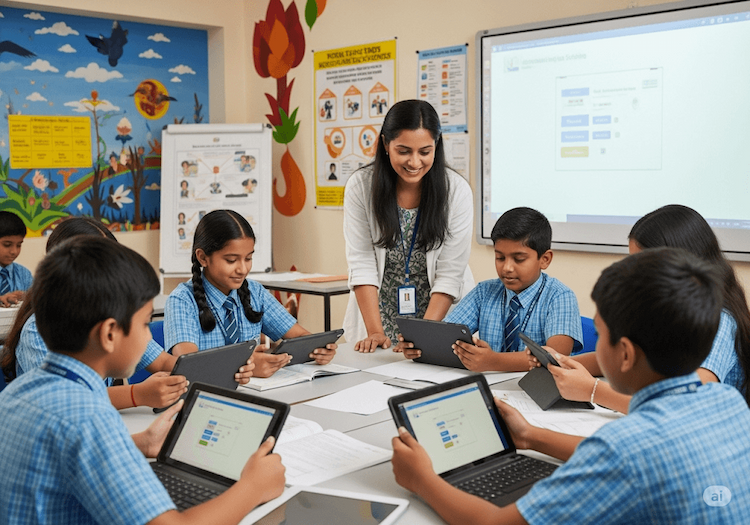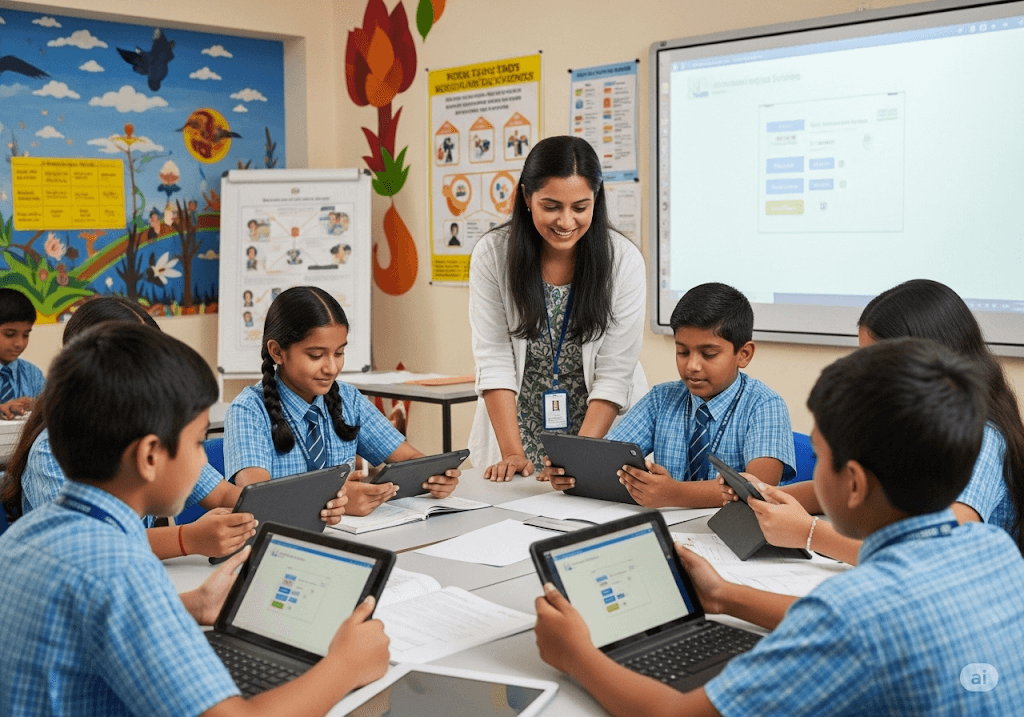
How CBSE Schools in Borivali are Adapting to 21st-Century Learning
In the bustling suburb of Borivali, Mumbai, CBSE schools are transforming education to prepare students for the demands of the 21st century. With rapid advancements in technology and evolving career landscapes, these schools are embracing innovative teaching methods, fostering critical skills, and engaging communities to create holistic learning environments. This blog explores how CBSE schools in Borivali are adapting to modern educational needs, ensuring students thrive in a dynamic world.
The Shift to 21st-Century Learning in Borivali’s CBSE Schools
Education today goes beyond textbooks and exams. CBSE schools in Borivali are redefining classrooms by integrating technology, promoting critical thinking, and encouraging collaboration. Here’s how they’re shaping the future of education: Technology-Driven Classrooms:
CBSE schools in Borivali are equipping classrooms with interactive tools like smartboards, tablets, and virtual learning platforms. These tools make lessons engaging and accessible, allowing students to explore concepts through videos, simulations, and real-time quizzes. Digital literacy programs ensure both students and teachers are adept at using these technologies effectively.
Project-Based Learning for Real-World Skills: Project-based learning in CBSE Borivali schools is gaining momentum as a way to foster creativity and problem-solving. Students work on hands-on projects, such as designing sustainable models or coding apps, which connect academic concepts to real-world applications. This approach encourages teamwork, innovation, and practical knowledge.
Focus on Soft Skills and Critical Thinking: To prepare students for global challenges, CBSE schools emphasize skills like communication, collaboration, and adaptability. Activities like debates, group discussions, and leadership workshops help students develop these competencies. Critical thinking is nurtured through inquiry-based lessons, enabling students to analyze and solve complex problems.
Integration of STEM and Coding: Science, Technology, Engineering, and Mathematics (STEM) programs are a priority in Borivali’s CBSE schools. Coding classes, robotics labs, and maker spaces allow students to experiment and innovate. These initiatives spark curiosity and prepare students for tech-driven careers.
Personalized Learning Paths: Recognizing that every student learns differently, CBSE schools in Borivali are adopting adaptive learning technologies. These tools tailor lessons to individual needs, helping students progress at their own pace. Teachers use data analytics to track performance and provide targeted support.
Community and Parental Involvement: Schools are fostering stronger ties with parents and local communities to enhance learning. Workshops, parent-teacher forums, and community projects create a collaborative ecosystem. Parents are encouraged to participate in career counseling sessions and skill-building activities, aligning education with real-world expectations.
Holistic Development Through Extracurriculars: Beyond academics, CBSE schools in Borivali prioritize extracurricular activities like sports, arts, and social service. These programs build resilience, creativity, and empathy, ensuring students grow into well-rounded individuals ready for 21st-century challenges.
Why 21st-Century Learning Matters
The modern world demands skills like adaptability, digital fluency, and creative problem-solving. CBSE schools in Borivali 21st-century learning initiatives ensure students are not just academically proficient but also equipped to navigate an ever-changing global landscape. By blending technology, innovative teaching, and community engagement, these schools are creating future-ready learners.
Frequently Asked Questions (FAQs)
1. What is 21st-century learning in CBSE schools? It refers to modern educational practices that focus on technology integration, critical thinking, collaboration, and real-world skills to prepare students for future challenges.
2. How are CBSE schools in Borivali using technology in classrooms? They incorporate smartboards, tablets, and virtual platforms to make learning interactive and engaging, alongside teaching digital literacy.
3. What is project-based learning in CBSE Borivali schools? Project-based learning involves hands-on projects like designing models or coding apps, encouraging creativity and teamwork.
4. How do CBSE schools in Borivali develop soft skills? Through activities like debates, group discussions, and leadership workshops, students build communication, collaboration, and adaptability.
5. Are parents involved in the learning process? Yes, schools engage parents through workshops, forums, and community projects to align education with real-world needs.
6. Why is STEM important in CBSE schools? STEM programs, including coding and robotics, prepare students for tech-driven careers by fostering innovation and problem-solving.
7. How do CBSE schools in Borivali ensure holistic development? They offer extracurricular activities like sports, arts, and social service to build resilience, creativity, and empathy.
Conclusion
CBSE schools in Borivali are paving the way for a future-ready education by embracing 21st-century learning. From technology-driven classrooms to project-based learning in CBSE Borivali, these schools are equipping students with the skills and mindset to succeed in a dynamic world. Parents and educators can trust that these institutions are committed to fostering innovation, critical thinking, and holistic growth, ensuring students are prepared for the challenges and opportunities ahead.

How CBSE Schools in Borivali are Adapting to 21st-Century Learning
In the bustling suburb of Borivali, Mumbai, CBSE schools are transforming education to prepare students for the demands of the 21st century. With rapid advancements in technology and evolving career landscapes, these schools are embracing innovative teaching methods, fostering critical skills, and engaging communities to create holistic learning environments. This blog explores how CBSE schools in Borivali are adapting to modern educational needs, ensuring students thrive in a dynamic world.
The Shift to 21st-Century Learning in Borivali’s CBSE Schools
Education today goes beyond textbooks and exams. CBSE schools in Borivali are redefining classrooms by integrating technology, promoting critical thinking, and encouraging collaboration. Here’s how they’re shaping the future of education: Technology-Driven Classrooms:
CBSE schools in Borivali are equipping classrooms with interactive tools like smartboards, tablets, and virtual learning platforms. These tools make lessons engaging and accessible, allowing students to explore concepts through videos, simulations, and real-time quizzes. Digital literacy programs ensure both students and teachers are adept at using these technologies effectively.
Project-Based Learning for Real-World Skills: Project-based learning in CBSE Borivali schools is gaining momentum as a way to foster creativity and problem-solving. Students work on hands-on projects, such as designing sustainable models or coding apps, which connect academic concepts to real-world applications. This approach encourages teamwork, innovation, and practical knowledge.
Focus on Soft Skills and Critical Thinking: To prepare students for global challenges, CBSE schools emphasize skills like communication, collaboration, and adaptability. Activities like debates, group discussions, and leadership workshops help students develop these competencies. Critical thinking is nurtured through inquiry-based lessons, enabling students to analyze and solve complex problems.
Integration of STEM and Coding: Science, Technology, Engineering, and Mathematics (STEM) programs are a priority in Borivali’s CBSE schools. Coding classes, robotics labs, and maker spaces allow students to experiment and innovate. These initiatives spark curiosity and prepare students for tech-driven careers.
Personalized Learning Paths: Recognizing that every student learns differently, CBSE schools in Borivali are adopting adaptive learning technologies. These tools tailor lessons to individual needs, helping students progress at their own pace. Teachers use data analytics to track performance and provide targeted support.
Community and Parental Involvement: Schools are fostering stronger ties with parents and local communities to enhance learning. Workshops, parent-teacher forums, and community projects create a collaborative ecosystem. Parents are encouraged to participate in career counseling sessions and skill-building activities, aligning education with real-world expectations.
Holistic Development Through Extracurriculars: Beyond academics, CBSE schools in Borivali prioritize extracurricular activities like sports, arts, and social service. These programs build resilience, creativity, and empathy, ensuring students grow into well-rounded individuals ready for 21st-century challenges.
Why 21st-Century Learning Matters
The modern world demands skills like adaptability, digital fluency, and creative problem-solving. CBSE schools in Borivali 21st-century learning initiatives ensure students are not just academically proficient but also equipped to navigate an ever-changing global landscape. By blending technology, innovative teaching, and community engagement, these schools are creating future-ready learners.
Frequently Asked Questions (FAQs)
1. What is 21st-century learning in CBSE schools? It refers to modern educational practices that focus on technology integration, critical thinking, collaboration, and real-world skills to prepare students for future challenges.
2. How are CBSE schools in Borivali using technology in classrooms? They incorporate smartboards, tablets, and virtual platforms to make learning interactive and engaging, alongside teaching digital literacy.
3. What is project-based learning in CBSE Borivali schools? Project-based learning involves hands-on projects like designing models or coding apps, encouraging creativity and teamwork.
4. How do CBSE schools in Borivali develop soft skills? Through activities like debates, group discussions, and leadership workshops, students build communication, collaboration, and adaptability.
5. Are parents involved in the learning process? Yes, schools engage parents through workshops, forums, and community projects to align education with real-world needs.
6. Why is STEM important in CBSE schools? STEM programs, including coding and robotics, prepare students for tech-driven careers by fostering innovation and problem-solving.
7. How do CBSE schools in Borivali ensure holistic development? They offer extracurricular activities like sports, arts, and social service to build resilience, creativity, and empathy.
Conclusion
CBSE schools in Borivali are paving the way for a future-ready education by embracing 21st-century learning. From technology-driven classrooms to project-based learning in CBSE Borivali, these schools are equipping students with the skills and mindset to succeed in a dynamic world. Parents and educators can trust that these institutions are committed to fostering innovation, critical thinking, and holistic growth, ensuring students are prepared for the challenges and opportunities ahead.
